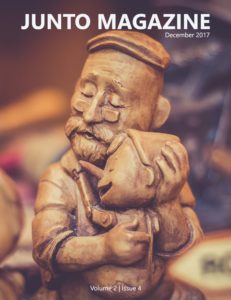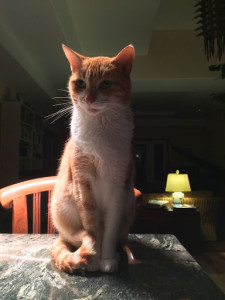Published in the Spring 2018 issue of Sky Island Journal, this is an excerpt from the forthcoming memoir, Evelio’s Garden: Memoir of a Naturalist in Costa Rica.
Now, in the still, moonlit nights, insomnia has company.
Wup, wup, whoo, whoooo.
An owl challenges the jungle of the quebrada by the house. Everyone marvels at how tranquil our place is, but they’re used to the noises of cities and towns. Out here the sounds drop into the night silence like thunder.
It begins with the owl. From our quebrada he calls to another in the quebrada to the south. A small echo coming back, saying what?
Crickets playing a triad – two tones perfectly spaced at a third – offer a metallic accompaniment.
The cicadas who screamed at sunset have already exploded and left their empty shells in the crannies of the trees.
A distant dog barks.
Later, no matter what the moon, a pack of coyotes hurls its protest at the stars. Little Flor – separated by millennia from her sisters – still remembers to howl in tune.
In the ceiling, all night long, the bats are chirping fussily over their busy comings and goings. There is the muffled beating of wings against the small, dusty spaces.
A gecko rustles across the skylight, and I hear the flat-footed thump of the cat’s paws on the kitchen counter, a better vantage point for contemplating the gecko’s tempting silhouette in the moonlight.
Even later, a small but insistent mew from the cat: she wants out.
The pump decides to gurgle, even though no one is drawing any water.
The breeze, blowing from the volcano, sighs back and forth like the ocean, and the great crossed limbs of the guanacaste tree groan against each other like two quarrelsome lovers in their sleep.
A lamp burns in my tiny room as my pen scratches across the page. It attracts an abejón that buzzes his frustration against the screen. There’s a hole in the screen, but he hasn’t found it yet.
In the small hours a far-off rooster crows.
Later, at five – right on time – the King of the howler monkeys roars in the dawn. He knows when the sun is about to rise. The rooster hasn’t figured it out.
Night sounds in the campo. I never feel alone. As I look out the window above my bed, lights out at last, I see the pale moon and constellations swinging through the bowl of blue and, distantly, ever so faintly, I can hear – beyond all the chirping and chatter of nearby things – the music of the planet tilting toward the sun.
(An earlier version appeared on this blog in the series on the use of our senses in writing.)





